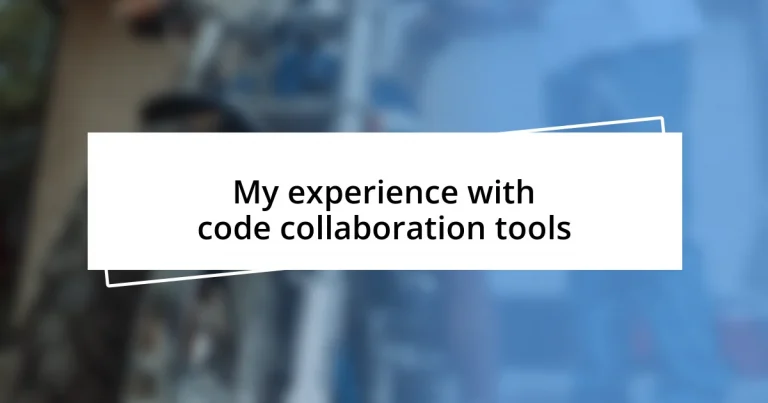Key takeaways:
- Collaboration tools enhance productivity, provide easy access to resources, and build community, improving team dynamics, especially in remote settings.
- Popular tools like GitHub, GitLab, and Visual Studio Live Share facilitate coding collaboration through features like version control, real-time sharing, and integrated CI/CD processes.
- Future trends in collaboration include AI-driven insights for code improvement, better visualization of complex codebases, and a focus on remote-friendly tools to foster diverse contributions.
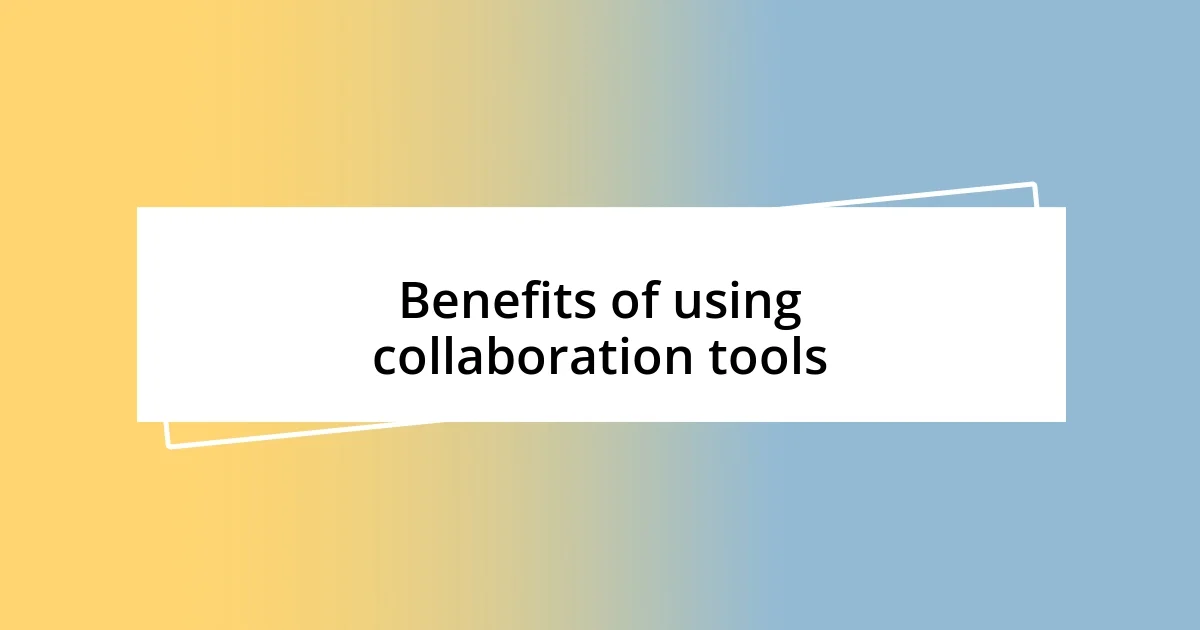
Benefits of using collaboration tools
One incredible benefit of using collaboration tools is the boost in productivity they provide. I remember a time when my team was juggling different tasks without a clear line of communication. It felt chaotic, and deadlines often slipped by. After adopting a collaboration tool, everything changed; tasks were aligned, and we felt more in tune with each other’s progress. Have you ever experienced that relief when everything finally falls into place?
Another advantage is the ease of access to shared resources. I can’t tell you how many times I’ve logged into a platform and found relevant documents or code snippets right at my fingertips. This accessibility not only saves time but also fosters an environment of shared knowledge—everyone contributes, and everyone learns. Doesn’t it feel great to know that your contributions are making a tangible difference for your teammates?
Lastly, I’ve found that collaboration tools cultivate a sense of community among team members, even if we’re miles apart. During a recent project, regular check-ins in our virtual space helped forge friendships that went beyond work. This camaraderie made our successes more rewarding and our challenges easier to tackle together. Have you ever felt that sense of belonging while working remotely? It can truly light up the working experience.
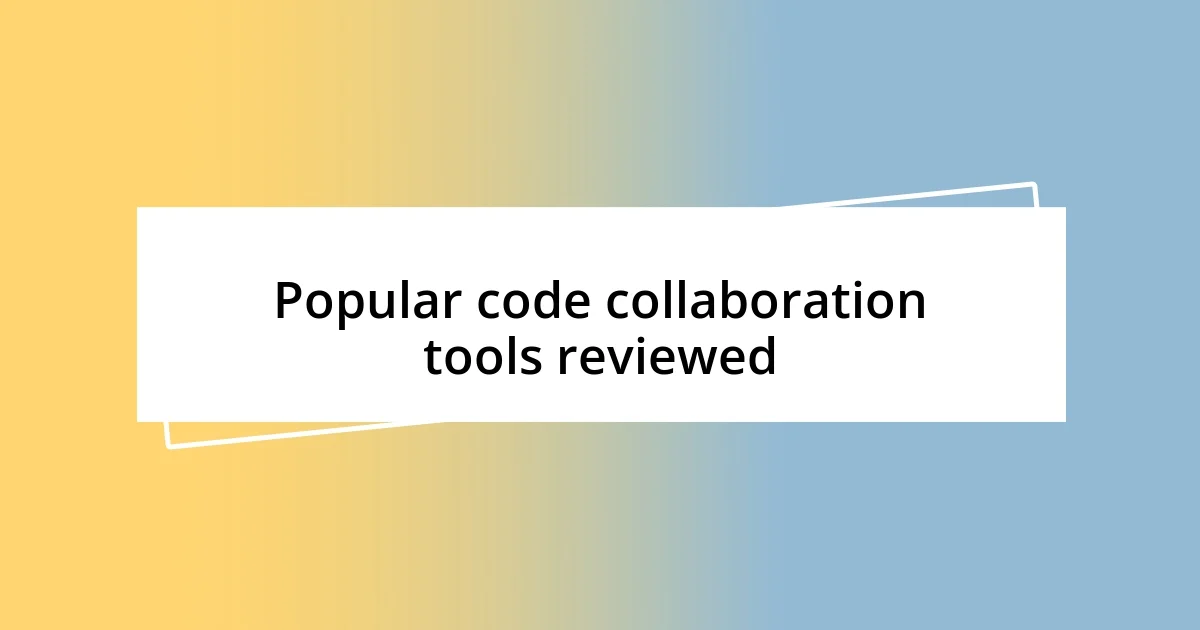
Popular code collaboration tools reviewed
When diving into popular code collaboration tools, I’ve had notable experiences with a few that stand out. GitHub, for example, feels like the quintessential platform for developers. I still remember the first time I pushed my code to GitHub—the blend of excitement and nervousness was palpable. Having the ability to showcase my work and receive feedback from other developers was a game changer. I could see my progress through version control, and collaborating with others became seamless.
Here’s a quick rundown of some popular tools that have enriched my coding experience:
- GitHub: Ideal for version control, it offers branching and merging capabilities that make collaboration intuitive.
- GitLab: A favorite for its integrated Continuous Integration/Continuous Deployment (CI/CD) features, enhancing project delivery.
- Bitbucket: Offers both Git and Mercurial support, with an appealing interface for managing repositories.
- Visual Studio Live Share: Turns any coding session into a collaborative effort in real-time, allowing multiple developers to work together seamlessly.
- Slack: While not exclusively a coding tool, its integration with various tools allows for effective team communication and updates on code changes.
Each tool has its unique strengths, and depending on your team’s needs, you may find one fits perfectly into your workflow. I remember experimenting with various platforms and how discovering the right one for our project filled me with a sense of accomplishment. It’s like finding that one perfect app that organizes your life—it changes everything!
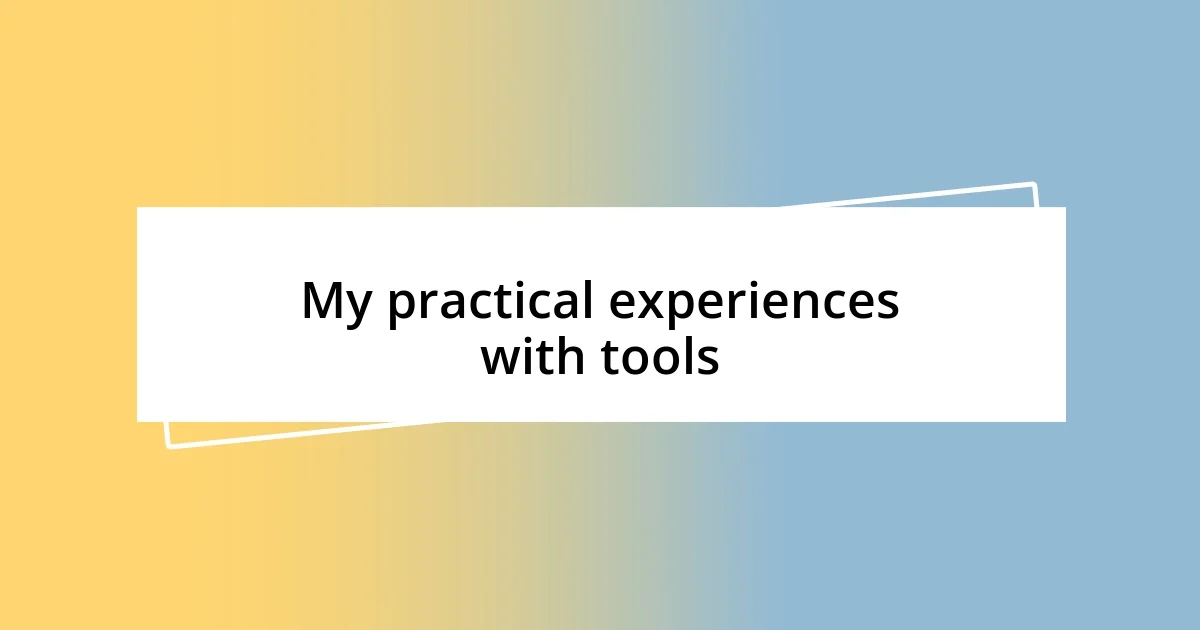
My practical experiences with tools
When working with collaboration tools, I often encounter various functionalities that shape my experience. For instance, using GitHub’s pull request feature was a revelation. I remember collaborating with a colleague on a challenging project. The ability to review each other’s code through comments and suggestions fostered a richer dialogue; it felt less like an assessment and more like a brainstorming session. Have you ever had that moment where feedback turns a good piece of code into something great?
I’ve also dabbled with Visual Studio Live Share, which honestly transformed how I approached real-time collaboration. I can vividly recall working late one night, coding alongside friends who were hundreds of miles away. As we debugged together—sharing pieces of code and ideas in real-time—it felt like we were coding in the same room. The thrill of collective problem-solving, even through a screen, created an energy that pushed our creativity to new heights. Isn’t it amazing how technology can bridge physical distances?
As for GitLab, the integrated CI/CD features were a game changer for our project timelines. There was a day when a deployment needed to be rushed due to an urgent client request, and with the click of a button, I saw our latest code changes running through the pipeline. I felt a sense of relief accompanied by the thrill of knowing every team member could witness this process live. It reminded me of racing against the clock, where every second counts—do you know that adrenaline rush?
| Tool | Strengths |
|---|---|
| GitHub | Version control, pull requests for code review |
| Visual Studio Live Share | Real-time collaboration, seamless sharing |
| GitLab | Integrated CI/CD, efficient deployment |
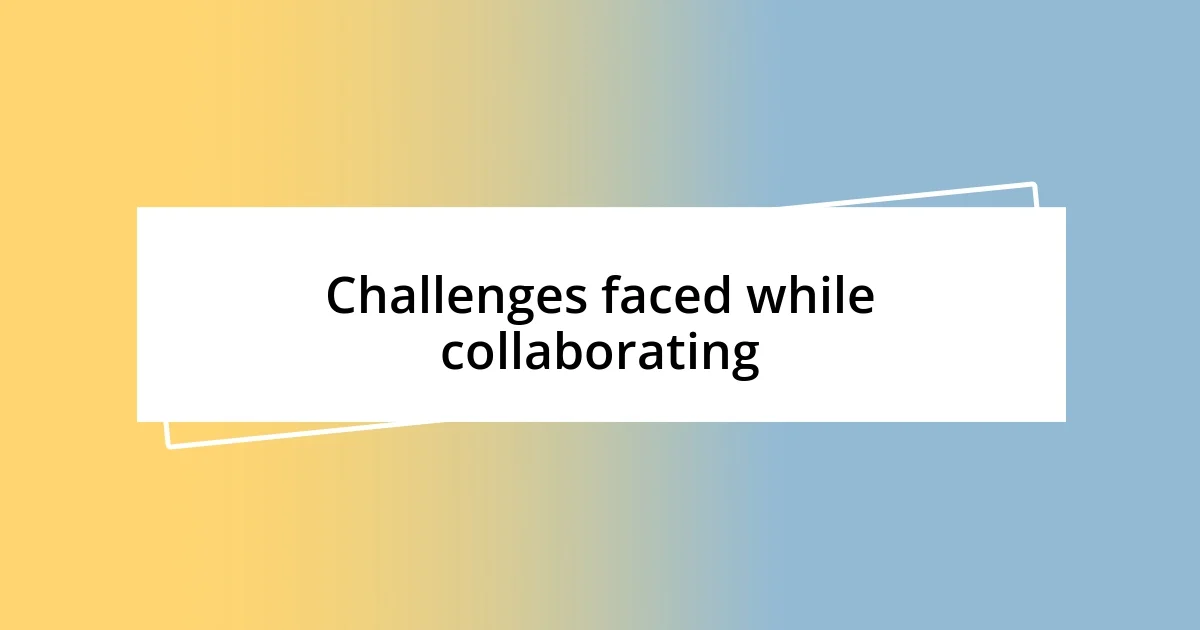
Challenges faced while collaborating
Collaboration can sometimes feel like an uphill battle. I remember a project where we were using Slack for communication, but important updates were easily lost in the shuffle of countless messages. Have you ever found yourself scrolling endlessly to catch up on a crucial thread? It can be frustrating, especially when miscommunication leads to duplicated efforts. Keeping everyone on the same page is essential, but it’s easier said than done.
Then there’s the challenge of merging code. I’ll never forget the feeling of dread when two developers worked on similar sections of code, and a merge conflict arose. It can dispel the excitement of collaboration quickly! The back-and-forth trying to resolve issues felt like navigating a maze, leaving me wondering how such a simple change could escalate into a complicated situation. Isn’t it ironic how a tool designed to simplify can sometimes complicate things?
On another occasion, I experienced the hiccup of onboarding new team members. Introducing them to GitLab’s CI/CD process made me realize just how steep the learning curve can be. It’s like bringing someone into a world that already feels established and intimidating. I found myself wishing for a smoother transition—how many times have you had to play the role of a mentor while juggling your own tasks? It’s a balancing act that requires patience, but ultimately, those shared experiences sometimes forge stronger connections within the team.
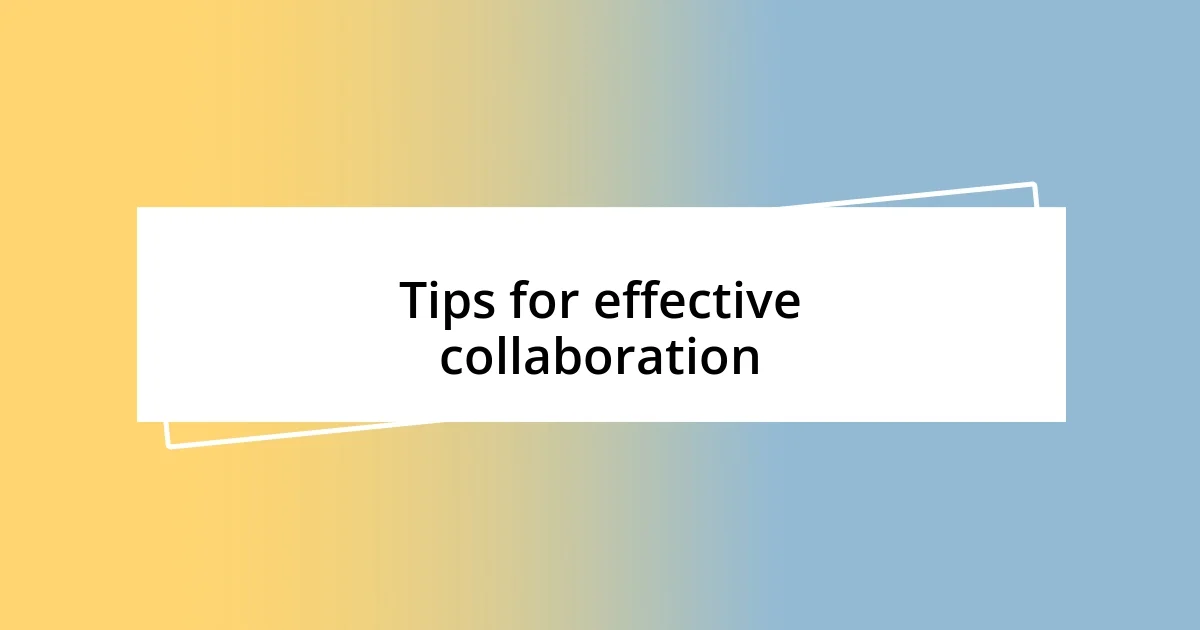
Tips for effective collaboration
To ensure effective collaboration, clear and consistent communication is paramount. I learned this the hard way during a team project involving multiple stakeholders. We started off with sporadic check-ins, and it quickly spiraled into confusion over project goals and timelines. Have you ever been in a situation where you felt out of the loop? Establishing regular meetings and using shared channels for updates made a dramatic difference, allowing everyone’s voice to be heard and fostering accountability.
Utilizing project management tools, like Trello or Asana, can also streamline collaboration. I vividly recall a time when we implemented a Kanban-style board for a software deployment. It was visually satisfying to move tasks through different stages, from “In Progress” to “Completed.” That tangible sense of progression kept the momentum alive. Have you tried using such tools? It feels great to see your contributions recognized and empowers everyone to stay aligned and focused.
Lastly, fostering a culture of respect and openness in feedback is crucial. During a code review, I remember a colleague’s candid approach to discussing my code. Instead of just pointing out flaws, he asked thought-provoking questions that helped me rethink my logic. It transformed what could have been a defensive situation into an engaging learning experience. Have you experienced this shift in perspective before? Promoting this respectful dialogue establishes trust and encourages team members to share their ideas without fear.
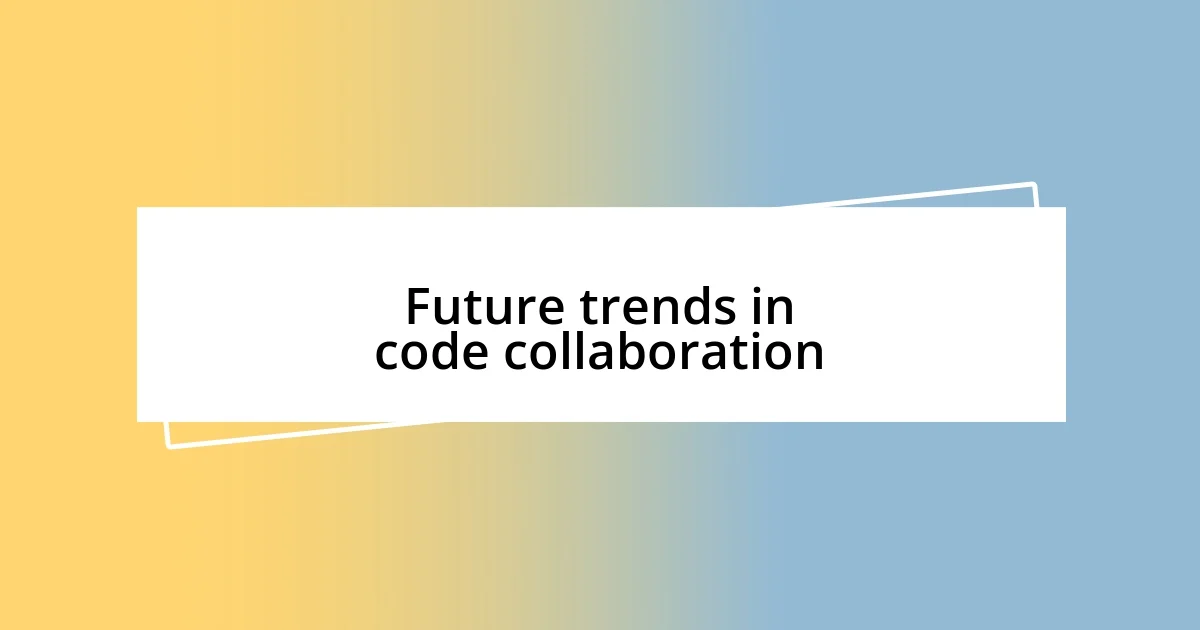
Future trends in code collaboration
As I look ahead to the future of code collaboration tools, I can’t help but think about the integration of artificial intelligence and machine learning. Picture this: automated code reviews that not only catch bugs but also suggest improvements based on best practices. It’s like having a mentor available 24/7. Have you ever wished for insights that could elevate your coding skills in real time? I certainly have. This could redefine how we learn from our mistakes and deepen our understanding of coding paradigms.
Another exciting trend is the shift towards improved code visualization tools. I remember the times when I struggled to grasp the big picture of complex codebases. Imagine a tool that allows you to see your code’s architecture in a more digestible and interactive way. This could lead to fewer misunderstandings among team members. Wouldn’t it be great to visualize dependencies and impacts before making changes? As the technology continues to evolve, our ability to collaborate effectively hinges on our ability to see and understand code in a more holistic manner.
Lastly, I believe we’ll increasingly see a focus on remote-first collaboration tools. With teams now spread across the globe, flexibility and accessibility have become essential. I once participated in a hackathon that truly embraced a fully remote format, and it amazed me how diverse our ideas became with such varied perspectives. Does this not highlight the importance of inclusivity in development? As we move forward, creating spaces where everyone feels empowered to contribute—no matter where they are—will undoubtedly foster innovation and creativity in ways we haven’t yet imagined.












